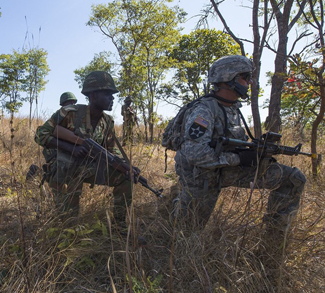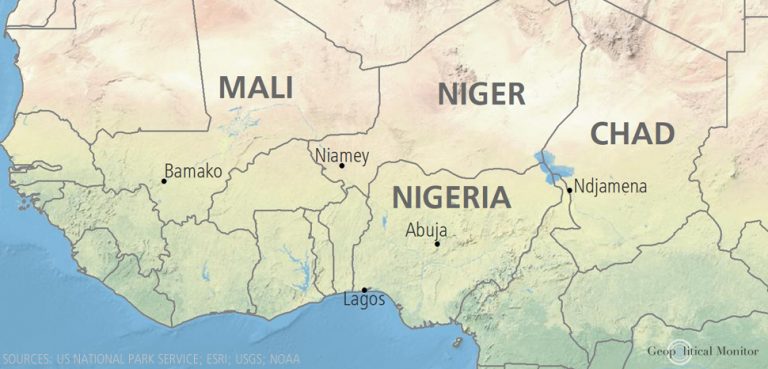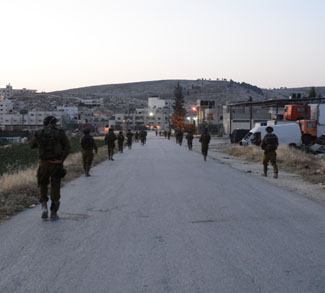The U.S. has been engaged in Niger for nearly two decades, significantly ramping up its presence in 2013, when it established a drone base. There was a recognition of the strategic importance of Niger due to its location and the escalating threat of terrorism in the region at the height of the global War on Terror. These threats stem from a nexus of militant groups that have found a foothold across the Sahel, most prominently Al-Qaeda in the Islamic Maghreb (AQIM), the Islamic State in the Greater Sahara (ISGS), and Boko Haram, among others. To date, these organizations spearhead a complex and adaptive insurgency, exploiting ungoverned spaces, inter-communal conflicts, and the persistent fragility of Sahelian states, whose security forces have often been overwhelmed by the militants’ operational tempo.
The scale of the groups’ operations has escalated over the years, with the number of violent events linked to these militant groups in the Sahel increasing fivefold since 2016. Their activities have had a devastating impact, displaced millions, and spawned new crises as far as southern Europe owing to a surge in migrant arrivals from North African shores. Furthermore, the violence perpetrated by these groups – including IED attacks, kidnappings, and targeted killings – has taken a grave toll on vulnerable civilian populations, directly challenging the counterterrorism efforts of a once Western-led global coalition that included the Sahelian states.
In Niger, US counterterrorism assistance has been critical in developing local force capabilities to confront these threats. However, the effectiveness of this assistance has been tested by the mutating threat landscape and by shifts in US strategic priorities. A recent coup wave followed by the swift arrival of Russian mercenaries created new complications, exacerbated by an equally fast-paced withdrawal of French and European forces from the area.
What is left now is a restless Sahel, where the few functioning state institutions that remain suffer from a combination of bad governance as well as the fallout from profound ethnic conflicts, and escalating resource trafficking. Once upon a time, robust US support was a critical pillar of relative stability. However, the impending total absence of strong US engagement could lead to several consequences.
Without a strong foothold in the Sahel, the United States will lose visibility into the operational dynamics of violent extremist groups, compounding the challenge of addressing broader transnational threats. Among these, illicit trafficking—particularly of arms, drugs, and persons—flourishes under the region’s instability. Migrant smuggling alone between Burkina Faso, Chad, Mauritania, Mali and Niger has turned into a lucrative industry, estimated to generate around US $300 million annually from routes heading to Europe, not to mention significant intra-regional flows.
Additionally, the Sahel serves as a transit hub for narcotics, with local drug production recently emerging alongside traditional trafficking routes that channel substances from Latin America to Europe. Moreover, the region’s market for small arms and light weapons, fueled by both local conflicts and external supplies—predominantly from former Warsaw Pact nations and increasingly from China—facilitates the proliferation of armed violence and empowers terrorist and criminal networks.
Organized crime syndicates in the Sahel have also been implicated in extensive human trafficking rings, exploiting the vulnerable through forced labor and sexual exploitation, notably with Nigerian women often victimized across Africa. The intertwining of these illicit activities not only undermines regional security but also escalates the humanitarian crises, compounding existing governance failures.
In sum, the robustness of US support is tied not only to curbing the spread of terrorism but also to maintaining a geopolitical balance that underpins the regional powers’ internal control and governability, preventing the types of economic, political and social disruptions that have cascading consequences both locally and internationally.
Where to go from here?
As the United States navigates the complexities of its imminent withdrawal from Niger, alongside growing anti-Western sentiment in Chad, and the noticeable encroachment of Russia and China within the Sahel region, a strategic recalibration of its approach is essential. This recalibration must consider domestic concerns over prolonged foreign engagements and the contour of global power competitions, particularly in an election year.
The following are concrete recommendations for rebuilding a significant U.S. presence and influence in the Sahel:
Enhance Regional Partnerships Beyond Military Cooperation
The United States should deepen its engagement with littoral West African countries (Benin, Côte d’Ivoire, Ghana, Guinea, and Togo), focusing not just on counterterrorism and defense but also on strengthening political institutions, economic development, and social cohesion. This broadening of scope, encouraged under initiatives like the Global Fragility Act (GFA), creates resilience against extremist influences and addresses root causes of instability.
Deploy diplomatic missions to foster political dialogues that include diverse societal voices, thus promoting inclusivity, which undercuts extremist narratives.
Leverage Technology and Intelligence Sharing
To counteract the reduction in physical presence, the U.S. should invest in local and regional capacities for intelligence, surveillance, and reconnaissance (ISR). This can involve the transfer of technologies, training for local forces, and the establishment of intelligence-sharing frameworks that compensate for the diminished direct US military presence.
Offer comprehensive training packages and technical support for the operation of ISR assets like drones, emphasizing sovereign African ownership and operation within agreed frameworks.
Address the Root Causes of Anti-West Sentiment
With anti-West sentiment on the rise, particularly in areas like Chad, the U.S. needs to engage in multi-layered public diplomacy campaigns aimed at demonstrating the benefits of US-Africa partnerships. These efforts should highlight mutual respect, shared benefits, and common goals, distancing from past perceptions of Western exploitation or paternalism.
Sponsor community development programs and cultural exchange initiatives that showcase the mutual benefits of US-Sahel partnerships, focusing on education, healthcare, and economic development.
Counter Russian and Chinese Influence through Strategic Economic Investments
Given the strategic vacuum that the US withdrawal might create, which Russia and China are keen to fill, the U.S. must counteract through strategic economic engagements. This involves not just aid but investments in critical sectors like energy, infrastructure, and technology, which offer reciprocal economic benefits and strengthen ties.
The U.S. should initiate infrastructure projects that employ local labor and management, ensuring these projects address local needs and US strategic interests, like energy independence from Russian supplies.
Adapt Military Engagement to Support Soft Power Initiatives
While the narrative around “forever wars” demands a reduction in military footprint, the U.S. can still maintain a form of security presence through training and support roles that are less visually intrusive but equally effective. This approach reduces antipathy in both domestic and international arenas while maintaining security cooperation.
The U.S. must shift from direct combat roles to advisory and support roles. Increase the capacity of African forces through training programs that emphasize respect for human rights and civilian protection.
Foster Regional Coalitions and Partnerships
The complex security landscape of the Sahel, characterized by porous borders and transnational threats, necessitates a collective approach. The U.S. should facilitate and support the strengthening of regional organizations and coalitions that can address security, economic, and political challenges comprehensively.
The U.S. must strengthen the operational capabilities and political cohesion of the G5 Sahel Joint Force, ensuring it has the resources and mandate to tackle cross-border security challenges effectively.
Invest in Counter-Propaganda Campaigns
Given the sophisticated use of media by entities like the Islamic State to highlight governance activities in Africa, the U.S. must invest in counter-narratives that showcase the failures of extremist governance and the benefits of democratic, inclusive political models.
The U.S. should support local media outlets and civil society organizations in developing and disseminating content that highlights the successes of democratic governance and counters extremist propaganda.
The United States can rebuild a strong presence in the Sahel not by doubling down on military might but by judiciously balancing soft power with targeted support for security initiatives. This approach will require patience, adaptability, and a willingness to engage in genuine partnership.
Hafed Al-Ghwell is the Executive Director of the North Africa Initiative (NAI) and Senior Fellow at the SAIS Foreign Policy Institute (FPI), Johns Hopkins University.
The views expressed in this article belong to the author(s) alone and do not necessarily reflect those of Geopoliticalmonitor.com.




